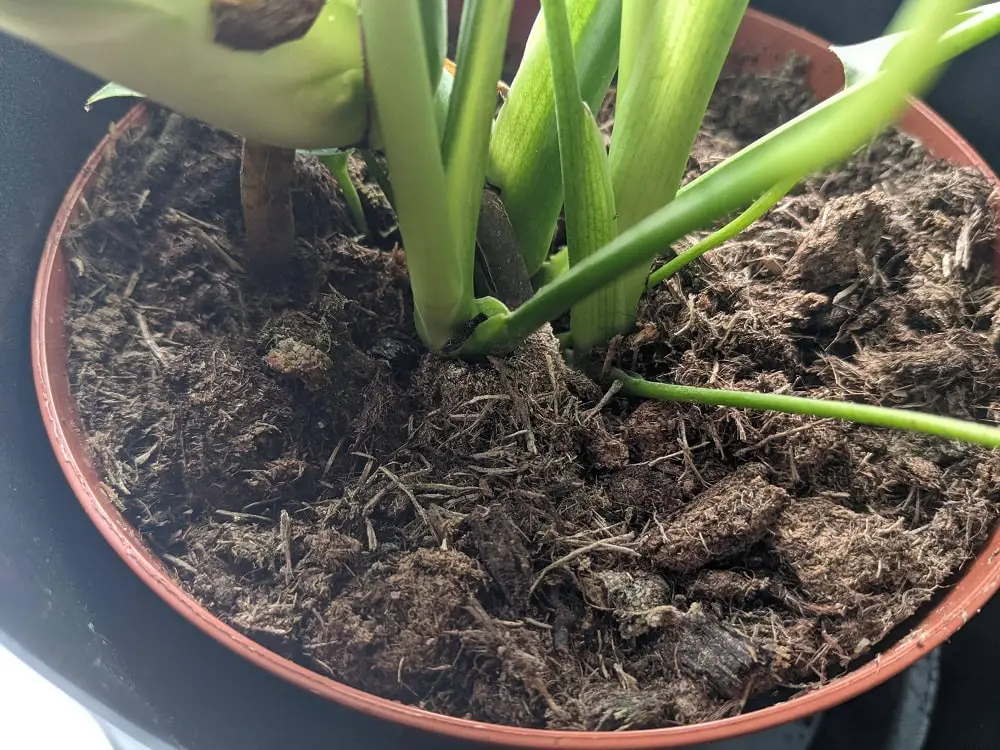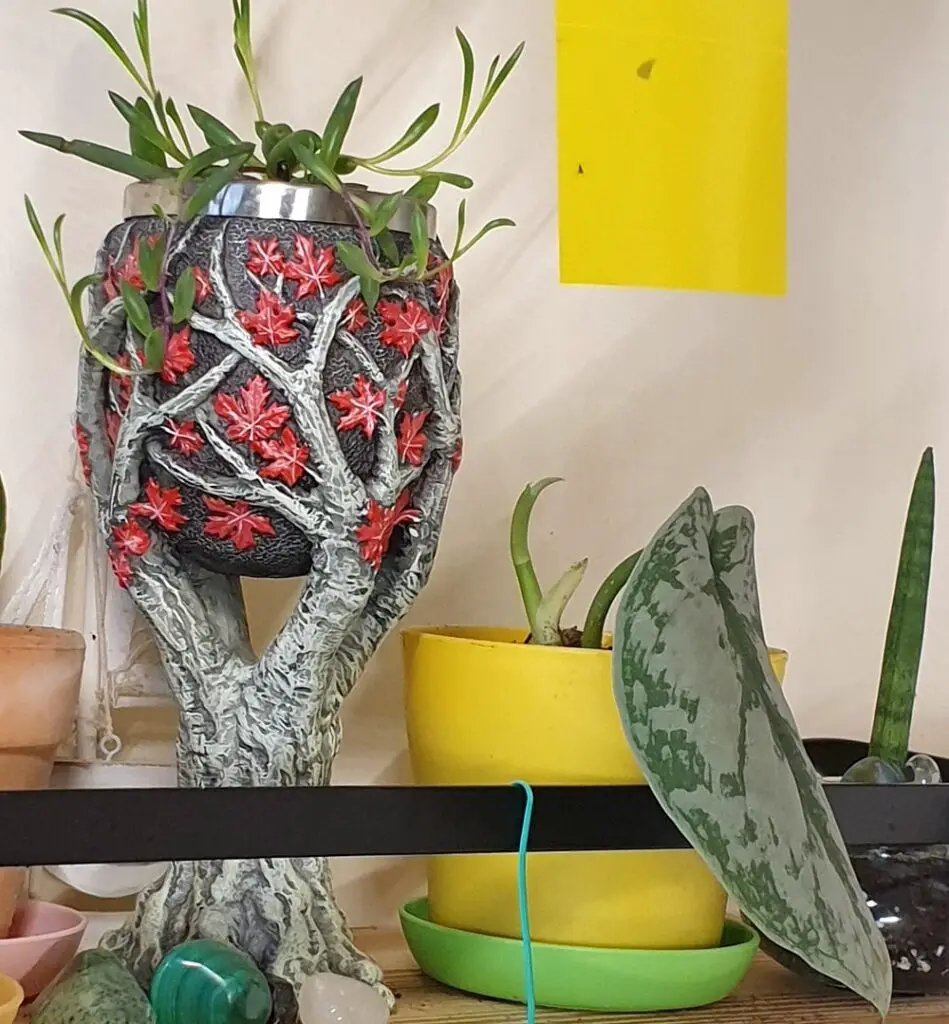Houseplants need nutrients to grow to their full potential. Homemade fertilizer is the safest and effective since it enhances the steady release of nutrients in the potting soil. Besides that, it’s eco-friendly and helps to improve the quality of the potting mix over a given period.
So, how do you make homemade fertilizers for indoor plants? By use of household wastes like eggshells, coffee grounds, green tea bags, banana peels, matchsticks, cooking water, compost, and aquarium water.
Homemade fertilizers are better than chemical fertilizers. If not applied appropriately, chemical fertilizers are harmful to indoor plants. I recommend using homemade natural fertilizer to experience beautiful houseplant growth throughout the year.
Keep reading this article to learn how to make homemade fertilizers for indoor plants. We will also look at some of the advantages associated with homemade plant fertilizer over chemical fertilizers.
You Can Also Read: How Do Self-Watering Pots Work?

10 Easy DIY Homemade Houseplant Fertilizer Recipe
To fertilize houseplants naturally involve the use of kitchen and household wastes. These ingredients are inexpensive and readily available at home.
But learning how to make homemade fertilizers for indoor plants is crucial. The good news is that making homemade plant fertilizer is a no-brainer.
It’s an exciting feeling to learn how to make organic fertilizer for indoor plants. Below are the top homemade houseplant fertilizer recipes to consider: (Source: University of Maryland.)
Use of Matchsticks
Matchsticks are excellent for providing nourishment for indoor plants. The waxy heads contain magnesium which is a vital element for many plants.
You’ll need to soak the matchsticks in water for the waxy heads to dissolve. Use the water-rich magnesium to irrigate your houseplants.
Another alternative is to insert crushed matchstick heads into the potting soil. The powder will release magnesium elements into the soil over a given period.
It is the most effective and simple DIY idea on how to make homemade fertilizer for indoor plants. It is also the best organic fertilizer for indoor plants.
Use of Eggshells
Every house generates eggshells as wastes. These household wastes are an incredible source of nutrients for indoor plants.
Eggshells consist of calcium carbonate. The compound is rich in calcium, ideal for fertilizing the houseplants.
You’ll need to crush the eggshells and mix them with the potting soil. You can also soak the crushed eggshells in a container full of water overnight.
Irrigate the houseplants to give them a dose of calcium. It is the best homemade liquid fertilizer for indoor plants.
Use of Coffee Grounds
Coffee grounds have a high nitrogen content ideal for growing indoor plants. The phosphoric acid makes the household waste suitable for houseplants that thrive in acidic soil.
You can use coffee grounds as compost or mix with the potting soil. Another alternative is by soaking the coffee grounds in water for a week.
Apply the coffee groundwater in the potting soil. It supplies nitrogen, potassium, and phosphorus to the plant to facilitate better foliage growth.
Banana Peels
Banana peels are rich in potassium, magnesium, phosphorus, and nitrogen. These components are excellent slow-release natural houseplant fertilizers.
You’ll need to cut the banana peels into small pieces and mix them with the potting soil. Another option is to puree in water and pour on the potting mix.
The banana peel pieces will decompose and release nutrients to the plant. Decomposed banana peels are the best organic fertilizer for indoor plants.
Aquarium Water
It is rich in nitrogen waste produced from decomposing fish waste and food. The nitrogen waste helps the houseplant to grow and develop stunning foliages.
Consider watering your houseplants with aquarium water rather than tap water. It is the best homemade liquid fertilizer for indoor plants.
If you’re practicing aquaponics, make use of the mutual environment. Aquarium water forms a natural fertilizer for indoor water plants.
Used Green Tea Bags
Green tea bags are a suitable and inexpensive natural fertilizer for indoor plants. But this homemade houseplant fertilizer recipe is ideal for those plants that thrive in an acidic environment.
The tannic acid in the green tea bags usually lowers the soil pH. It also increases nutrients concentration that fosters healthy houseplant growth.
You’ll need to keep and decompose the used green tea bags. Mix the compost with the potting soil to supply your indoor plants with the necessary nutrients.
Powdered Milk
It is a nutrient-dense fertilizer for houseplants. Powdered milk is rich in calcium that helps to improve soil quality and fertility.
Mix diluted powdered milk in the garden soil before planting the houseplant. The slow-release fertilizer will provide vital nutrients for your indoor plants.
Wood Ash from Fireplaces
Wood ash contains potassium and calcium carbonate minerals. These elements facilitate better indoor plant growth and well-being.
Apply a small amount of wood ash on the potting soil before watering. Dissolved wood ash can be absorbed by the plant roots with ease.
Wood ash also helps to get rid of insects or bugs around the houseplant. The double impact makes wood ash the best homemade plant fertilizer.
Rice Water Fertilizer
Soaked rice water is another excellent homemade liquid fertilizer for indoor plants. But it is a mild fertilizer though rich in NPK.
The starch in the rice water helps to facilitate the growth of beneficial soil bacteria. The NPK in the potting soil will encourage proper growth and health.
Soak rice in water for about 2-3 hours and drain it. Use the rice water to irrigate your indoor plants. The vital elements in the rice will facilitate healthy plant growth.
Kitchen Compost
The compost contains vital nutrients and microorganisms for your indoor plants. It is the best organic fertilizer for indoor plants.
Use fruits and vegetable remains to start a compost pile. Add water from time to time and keep turning the compost pile.
Water and soil microorganisms will encourage decomposition. Use dark rich soil when growing your indoor plants. (Source: University of Georgia.)
You May Also Like: How to Keep Moss Pole Moist
Advantages of Homemade Fertilizers for Indoor Plants
Environmental Friendly
These organic fertilizers for indoor plants are biodegradable and eco-friendly. The soil microorganism can decompose them with ease.
Inexpensive
All the homemade houseplant fertilizer methods discussed in the article are affordable. These methods make use of readily available household wastes.
Improve Soil Quality and Fertility
The homemade plant fertilizer adds organic nutrients to the soil to improve its quality and fertility. The soil aeration and proper drainage create an ideal environment for the plant to thrive.
Not Harmful to the Plant
The organic fertilizer for indoor plants has no adverse effects. The organic nutrients are gentle and safe for the houseplants. There are no harmful elements that might ruin your houseplants.
Readily Available
Most materials for making organic fertilizer for indoor plants are readily available. Every house is accessible to these household waste products.
Long Term Effect
The homemade plant fertilizer usually decomposes slowly and releases nutrients into the soil. These nutrients pose a long-term effect on the soil after a complete decomposition.
Proper Waste Management
Household wastes can be used to make homemade plant fertilizers. The practice contributes to the environmental cleaning process. Recycling of waste promotes proper waste management.

In Conclusion
Learn how to make homemade fertilizers for indoor plants is a no-brainer task. Homemade plant fertilizer comes with a lot of benefits when compared to chemical-based fertilizers.
Chemical fertilizers are harsh to houseplants and expensive to acquire. Besides that, these chemical-based fertilizers have short-term effects.
If you are looking to take care of your indoor plants, consider homemade plant fertilizers. The organic fertilizer for indoor plants is less harmful and result in long-term effects.
